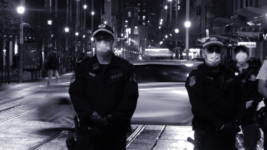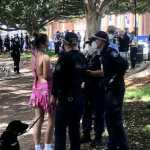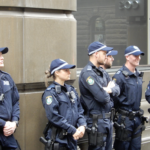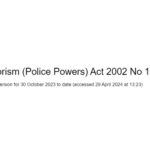The Ever-Increasingly and Unfounded Encroachments of Policing Powers in Public Places

Victorian premier Jacinta Allan announced a massive expansion of random knife search powers in her state on 13 March, as part of a broader youth crime crackdown that’s underway, which involves a 2009 law that allows Victoria police to approach civilians in public and randomly conduct searches for illegal items, concealed weapons or illicit substances, without the need of a reasonable suspicion.
And like so many of the rights-eroding blanket policing techniques that Australian governments have been habitually legislating over recent decades in order to appear tough on crime, the designated area search laws in Victoria have a staggeringly low success rate, as the data shows only 1 percent of the thousands searched turned up any illegal item, and this includes concealed weapons.
The powers granted to police under the various systems of Australian law have developed safeguards over time to prevent police randomly searching civilians based on appearance. The various search powers in NSW require an officer to have a suspicion based “on reasonable grounds” for stopping and searching a person. But increasingly, over recent decades, this is being eroded.
Queensland and NSW adopted their own designated zone laws over the last two years, which are not as invasive as those in Victoria, as the new laws apply specifically to randomly wanding passersby, or running a small metal detector over their clothes, rather than either a pat down search or a wanding in Victoria.
Although randomly stopping people in the street to wand them is highly invasive in itself.
And if we look at the state of NSW today, people of any age looking towards a big weekend can find themselves randomly confronted by highly flawed sniffer dogs, which, if they indicate wrong, could lead to a demoralising strip search, which most of the time prove fruitless, or otherwise a NSW resident might be subjected to a wand search, or be ordered to move-on from nearby a church.
Expanding a deplorably unsuccessful technique
Passed on 18 March, the Terrorism (Community Protection) and Control of Weapons Amendment Bill 2024, progressed a prohibition on machetes that will take effect in Victoria in September, while the designated area laws that permit for certain places to be deemed random search zones for 12 hour periods at a time, have now been extended to apply for 24 hours.
Prior to the changes a zone was permitted to be declared in an area where violence or disorder has occurred within the last 12 months, or an event that involved a violent incident in the past being staged again. But the amendments allow for the Victoria police chief commissioner to declare a designated area in a place where there is merely the likelihood of violence.
Liberty Victoria recently supplied The Age with designated area data that it had obtained from police via freedom of information, which revealed that over the 24 months to January 2023, 23,718 searches had been carried out in 61 designated areas, with 18,906 of these involving the use of a wand, and 4,812 comprising of pat down searches.
Of the 23,718 random searches, however, only 252 turned up an object or a substance, and that only accounts for 1 percent of overall searches. Yet, despite a 99 percent failure rate usually conveying that a process is highly defective and should be stopped, in Jacinta Allan’s Victoria, such a low success rate actually warrants expansion and further rollout.
These laws, which now operate in three Australian states, are problematic because they allow police officers to apply their prejudices, including any racial bias, when randomly selecting which civilians to subject to a pat down or wand search.
So, in the case of wanding in NSW, the old adage that a cop cannot search an individual because they don’t like the look of them or the clothes they are wearing is reversed, as officers are free to pick on anyone they please, without reason.
Highly flawed and traumatising
The rights-eroding nature of sniffer dog use by Victoria police is singled out for periodic criticism. But it’s the NSW police drug detection dog unit, which really takes the cake as the most notorious and imposing canine operation this country has.
Following the use of a sniffer dog unit during the 2000 Sydney Olympics, the government legislated laws that came into effect in early 2002, which allow for the warrantless use of drug dogs in certain public places, such as entrances to public transport, liquor outlets, sporting events, concerts, dance parties, parades, tattoo parlours and all public places in the Kings Cross precinct.
In a series of freedom of information requests over the last decade, former NSW Greens MLC David Shoebridge revealed that sniffer dogs are getting it wrong two-thirds to three-quarters of the time, which means that not only are civilians randomly sniffed out by a dog, but if it indicates them, a person is then subjected to a pat down search, which for the most part are unsuccessful.
Midway through last decade stories began emerging about people indicated by a dog and then being subjected to a fruitless pat down, subsequently being taken to a private area where two armed and uniformed police officers would order them to perform a strip search, which entails the removal of all clothes, and can be followed by the highly contested request of being asked to squat and cough.
Shoebridge further obtained the figures relating to strip searches in late 2018, which showed a 54 percent increase in their use over the previous four years, and these figures also revealed that strip searches that are applied following a dog indication and a fruitless pat down search end up securing no illicit items on 64 percent of occasions.
The Law Enforcement Conduct Commission conducted a number of inquiries into strip searches at festivals early this decade, which uncovered multiple breaches by officers. There’s clear evidence that these searches can traumatise people. And an inquest and an official inquiry found that sniffer dog use at festivals can cause punters to partake in dangerous drugtaking practices that can prove fatal.
Invading personal and public space
As with the reasoning behind the safeguards against random harassment from police, via the requirement that they have a valid reason to approach a person in public in order to search them, such as a ‘reasonable suspicion’, members of the community should be able to walk about in public free from law enforcement approach unless it appears that they have broken the law.
But increasingly, the authorities are rolling out these catch-all techniques, such as the use of sniffer dogs or wanding operations, that permit police officers to breach that line against unfounded approach, whether that be with the encouragement of a dog, or the invasive approach of a police officer with wand in hand, after a person unknowingly walks into an area that’s a designated zone.
The imposition of the 2022 NSW antiprotest regime took away the public’s ability to stage unauthorised protests at roads, tunnels, bridges or major facilities by applying draconian penalties.
And the Minns government is continuing to build upon this framework, to the point that unauthorised protests merely near places of worship have now been outlawed, and police have been empowered to move people on who are merely demonstrating close by a church.
Indeed, NSW Labor commenced the year with the roll out of three extreme law-and-order bills targeting hate speech, racial and religious hatred and protests near places of worship, only for the AFP to announce a few weeks later that the entire “antisemitic” crimewave that the laws had been predicated upon was an elaborate criminal hoax.
Yet, the government refuses to repeal these laws, even though its likely senior members of cabinet were privy to the fact that the spate of crimes was a fraud.
And the concerning aspect to this trend of enacting more all-pervasive policing powers upon all-pervasive powers is that despite the campaigns against them, the authorities resist calls for reform and continue with the injustices, and then rather than learning from these mistakes, politicians are emboldened to legislate evermore policing powers with the ability to shrink the public sphere.







